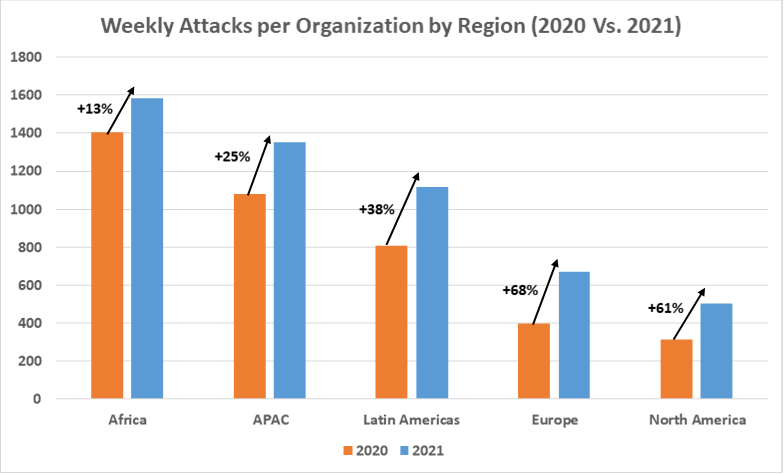There Are More Cyberattacks In Africa Than Anywhere Else

Cybersecurity might not be a frequently addressed topic in Africa’s digital economy. But, deducing findings from recent research, there is no better time than now to look into how the internet powering the world’s fastest-growing tech ecosystem can be safeguarded from cyberattacks from virtually around the world.
Per a new report from Check Point Research, there were more cyberattacks in 2021 than the previous year, no thanks to the unprecedented Log4j vulnerability discovered late last December. Cyberattacks spiked by 50 percent last year, with 925 per organization every week. In October, these threats grew 40 percent, with 1 of every 61 entities suffering a ransomware hit.
While there were more cybersecurity breaches around the world, the report says Africa had the most frequent attacks for 2021. On average, organizations experienced an 1,582 weekly episodes, marking a 13 percent increase from the previous year’s figures. Meanwhile, in a region like the Asia-Pacific, the average is 1,353 weekly per organization, 1,118 for Latin America, 670 for Europe, and 503 for North America.

The education and research sectors experienced the highest volume of bombarding, with an average of 1,605 attempts weekly per organization—marking a 75 percent increase over 2020. The government/military (1,136), communications (1,079) ISPs/MSPs (1,068) and healthcare (830) are the other “most affected” sectors.
In the second week of June 2020, Life Healthcare, the second-largest independent hospital operator in South Africa, said its admission systems were hit by a cyberattack, right in the middle of the pandemic. Unable to complete patient billing, submit medical aid claims, process supplier invoices, and generate financial reports, the company switched to manual systems to continue operations. Around the time, South Africa experienced multiple cyber attacks in different sectors, from insurance to credit and financial services.
Similarly, in October 2020, companies in the Ugandan banking and telecoms sector were hit by mobile money fraudsters. The hackers used about 200,000 SIM cards to infiltrate the country’s mobile money network and paid huge sums of money to the said cards across the nation.
Per investigations, the mobile money heist was pulled off by people believed to be affiliated with Pegasus Technologies, an Israeli cyberespionage tool. Pegasus is also connected to the “state-sponsored” attacks on iPhones in the country, in a bid to acquire valuable information from two journalists and a politician.
According to a separate 2021 report by McAfee Enterprise and FireEye, the novel coronavirus pandemic—which necessitated remote work as a new normal—brought about an 81 percent increase in the number of global organizations suffering increased cyber threats. Meanwhile, 79 percent of these establishments experienced downtimes resulting from cyber anomalies.
By 2025, 10 billion devices will have joined the Internet of Things (IoT) as emerging digital economies race to remain at the epicenter of the revolution. WeeTracker’s estimate of cumulative funding is still in the stables and soon to hatch. Still, there is much reason to believe that African startups raised a sum north of USD 4 B last year to build a tech ecosystem for its next billion.
The region, home to 40 of the fastest-growing emerging and developing markets, is currently the most entrepreneurial continent on the planet. With Africa looking to close its digital divide by 2030—by connecting the remaining populace to the internet—it is increasingly critical to consider cybersecurity. By 2025, cybercrime will be sitting on USD 10.5 T annually.
Omer Dembinsky, Data Research Manager at Check Point, says, “We’re in a cyber pandemic, if you will. I strongly urge the public, especially those in the education, government and healthcare sectors, to learn the basics on how to protect themselves. Simple measures such as patching, segmenting your networks and educating employees can go a long way in making the world safer.”
Featured Image: Infocyte